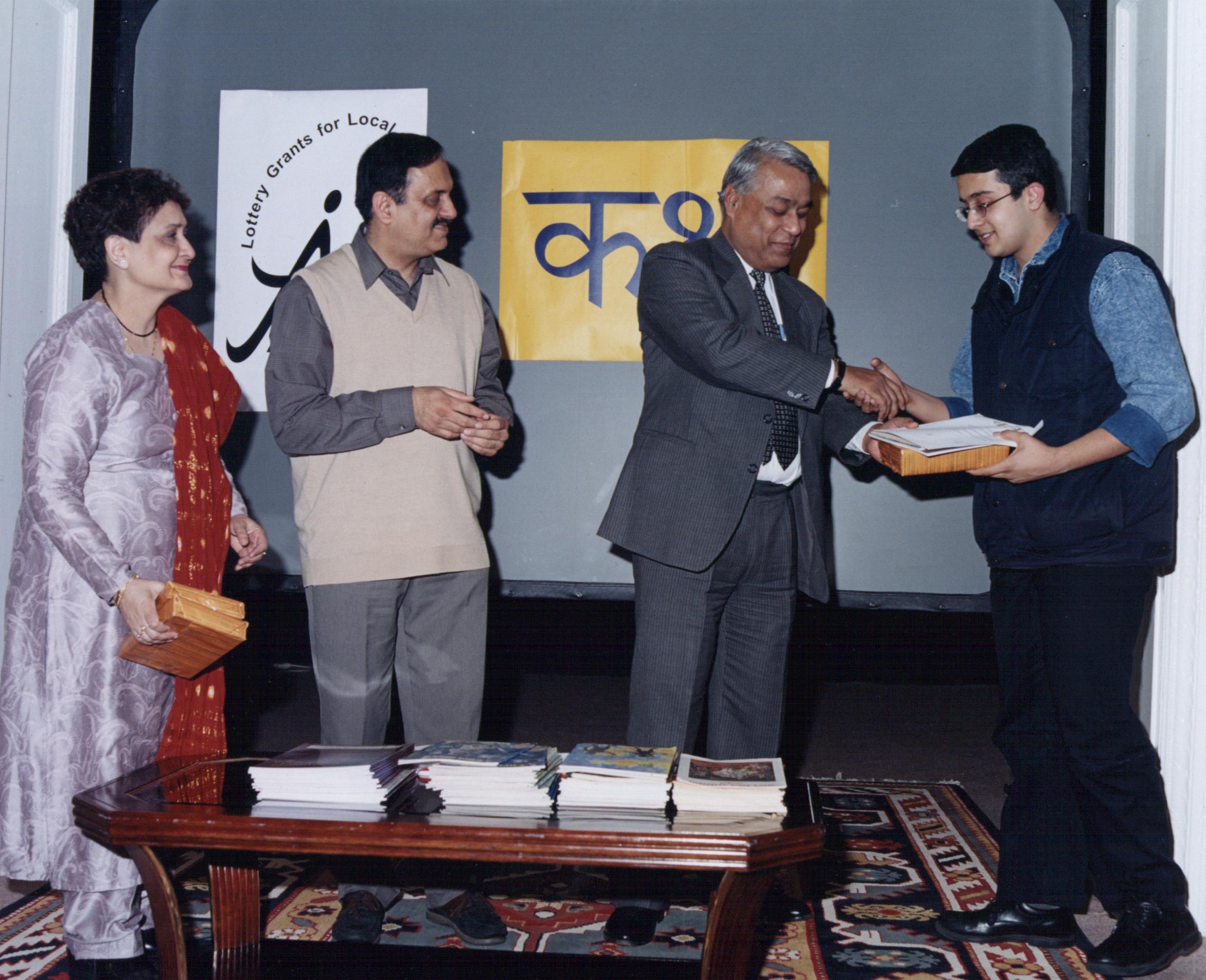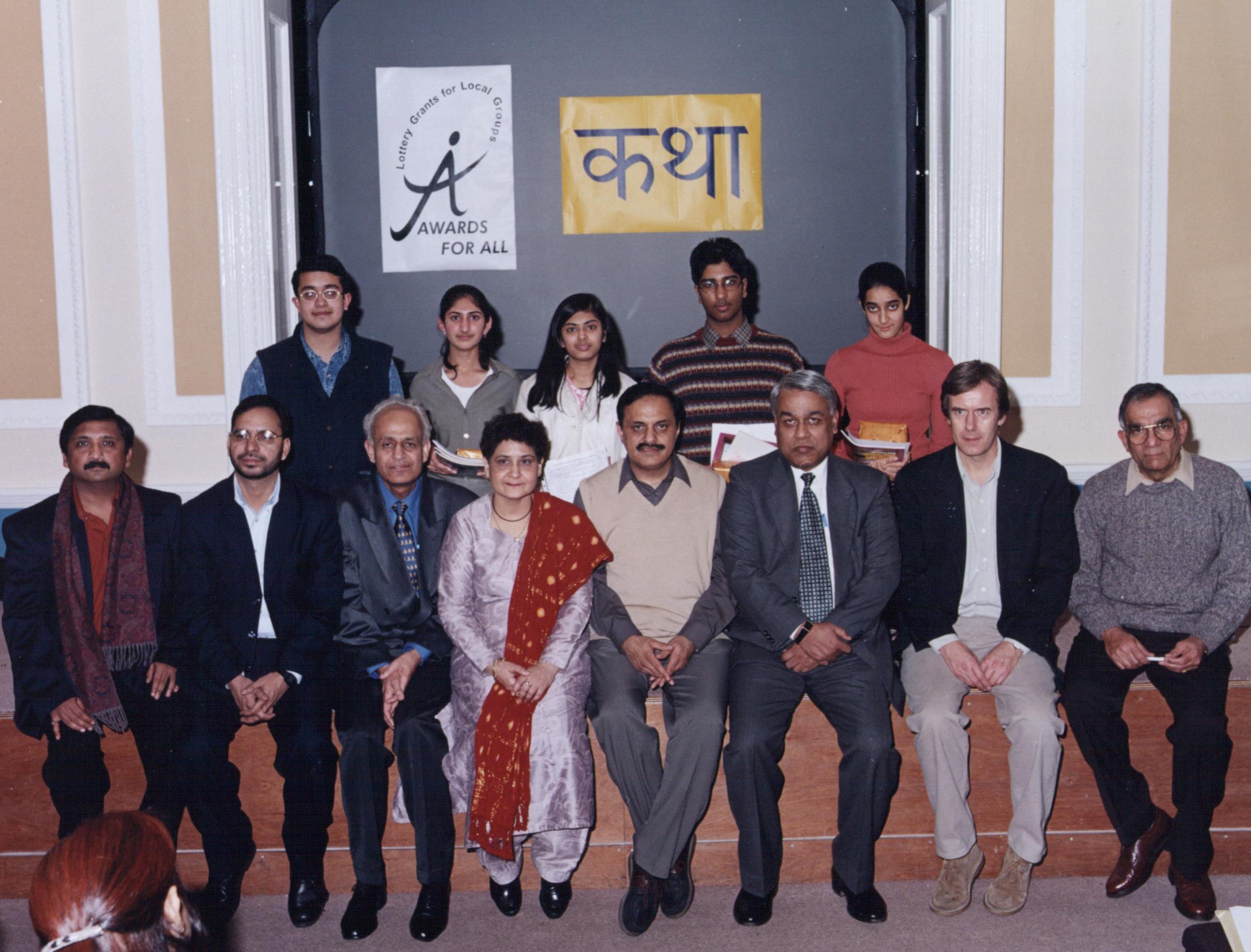|
"If we wish our next generations to learn Indian Culture, we must teach them our language, the Hindi language. The shoulders
of English are not strong enough to carry the burden of Indian culture." This is what Tejendra Sharma, the Secretary
of Katha, had to say and the occasion was the first short story workshop organised by Katha in which students from schools
in and around London participated. The workshop was organised with the help of the Millennium Commission and was held at the
Nehru Centre in central London.
The chief guest for the workshop was Mr. P.C. Haldar, Minister Co-ordination,
High Commission of India. Dr. Rupert Snell (School of Oriental and African Studies), Mr. Kailash Budhwar (former head BBC
World Service Radio, Hindi & Tamil), Mr. Ved Mohla (renowned Hindi teacher), Ravi Sharma (Sunrise Radio) addressed the
students about how to create a short story in Hindi. Deepti Sharma, herself a student of B.A. Business Administration at the
Westminster University, recited a traditional folk story (Lok Katha) entitled Thakur ki Moonch, in a very impressive style.
Divya Mathur, the chairperson of Katha, welcomed the participants; the guests and the speakers while Mr. Padmesh Gupta (Editor
- Purvaai) presented the vote of thanks. Twenty students participated in the workshop.
While addressing the students,
Tejendra Sharma said that any incident could be turned into a story. A writer has to add his imagination and purpose to the
incident and it becomes a story. What is apparent is not very important. What is behind the apparent; the situations, which
have created the apparent, are what a story is made of. A journey from the apparent to the minute is what a story is all about.
The language of today's short story is closely connected to today's life. It does not have to be deliberately difficult. He
talked about the stories scattered all around the life. According to Tejendra Sharma anything that touches your heart can
form the basis for a short story.
Mr. Ved Mohla, through a short story of his own, explained to the students as
to how an incident could be transformed into a short story. He referred to a statement of Munshi Prem Chand that stories are
scattered all around us. What is needed is a perceptive eye. Ved Mohla's eight students participated in the workshop.
Deepti Sharma recited the folk story Thakur Ki Moonch in her inimitable style. Her dramatic presentation of the story
won the hearts of all present.
Mr. Kailash Budhwar was completely overwhelmed by the occasion. Twenty students together
writing short story in Hindi, in London, made him completely emotional. He told the students that he wants to talk only to
them. He emphasised the need for originality in a story. He gave examples from Indian films where it was very easy to find
that they had been influenced by the films from Hollywood. This should not happen in literature. Kailash Budhwar judged the
stories written by the students for various prizes.

Mayank Sharma recieved the third prize for his short story titled, "Aur phir ek shaam"
|
 |
|
|
|
 |
|

At the short-story workshop organized by Katha, with the help of Millennium Commission at the Nehru Centre the five award
winning story writing students (at the back, from left Mayank Sharma (3rd prize), Dimple Bhatia (Consolation Prize), Amita
Juthani (Consolation Prize), Neeraj Pal (2nd prize) and Asha Walia (1st prize). Sitting in front (Lto R) Padmesh Gupta (Editor-Purvaai),
Anil Sharma (Hindi and Culture Officer, Indian High Commission), Ved Mohla (Eminent Hindi Teacher), Divya Mathur (Chairperson
- Katha), Tejendra Sharma (Secretary - Katha), P.K. Haldar (Minister Coordination - Indian High Commission), Dr. Rupert Snell
(S.O.A.S.), Kailash Budhwar (former head BBC Hindi Section)
Ravi Sharma, while using his impressive radio voice, won the hearts of students and parents alike. He recited one of his
short satirical stories and emphasised the point that entertainment is the prime factor for a good story. If a story is not
entertaining, the reader may not go through the entire story. If the language is deliberately difficult, the reader might
refuse to read the story. The language of a story must be simple, lucid and clear; so that an average reader can easily understand
it.
Dr. Rupert Snell, in a very dramatic style, showed to the students how an action could become the bases for
a short story. He gave an envelope to Tejendra Sharma and requested him to give it to Mr. Kailash Budhwar. Then he stated
that even this envelope has a story of its own. What is there in this envelope; where has it come from. The envelope is an
aerogramme; that means it is connected to a foreign country. The curiosity generated by this envelope can create a short story.
He read the opening paragraphs from the stories of Munshi Prem Chand and Divya Mathur and explained to the students that a
story can begin in many different ways.
The editor of Purvaai, Mr. Padmesh Gupta, while passing a vote of thanks
commented that the dream of Tejendra Sharma that he wants to see a student born in the United Kingdom writing a literary short
story in Hindi, is the dream of all present in this hall. He was deeply impressed by the happenings in the workshop and promised
that the first three stories would be printed in his magazine Purvaai.
The Chief Guest Mr. P.C. Haldar congratulated
the organization Katha for organizing such an important Hindi Workshop in this heartland of English. He was deeply moved by
the thought that Katha not only thought about this first ever workshop but also organized it so successfully. While congratulating
the office bearers of Katha Tejendra Sharma and Divya Mathur for the success of the Workshop, he promised that for such events,
the Indian High Commission would provide whatever help is possible. Mr. Haldar presented the prizes and awards to the students.
In the story writing competition Miss Asha walia came first; second prize went to Neeraj Pal while Mayank Sharma
bagged the third prize. Dimple Bhatia and Amita Juthani were presented the consolation prizes. All the participants were given
certificates and books as gifts. The Indian High Commission and Mr. Ved Mohla made these books available.
Among
others Mr. Anil Sharma, Hindi & Cultural Officer of the Indian High Commission, Mr. Navkesh Pal, the president of Gyandeep,
Ms. Chand Sharma, a well-known theatre personality and Reena Bhardwaj, attended the workshop.
|
 |
|
|
|
|
